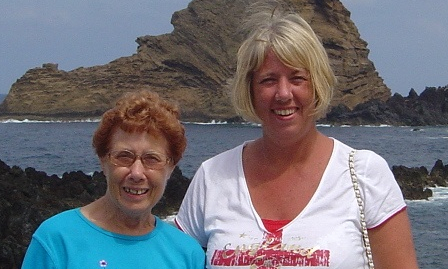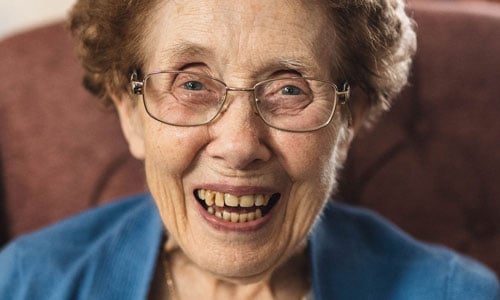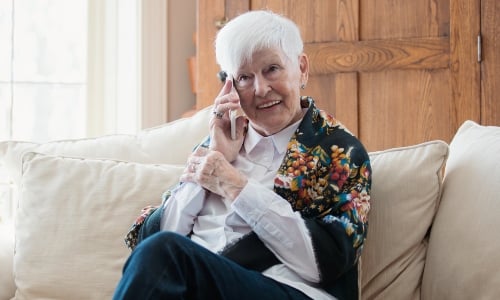Will you help someone like Brenda this Christmas?
A donation from you could give the gift of friendship to a lonely older person.
Loneliness is a crisis hiding in plain sight. Just ask 89-year-old Brenda. Sometimes she’ll take the stairlift downstairs and sit by the open front door of her south London flat, risking the cold to get a view different to the same four walls she sees everyday.
“I watch as the buses go past, and I’ve got people walking by as well,” explains Brenda. “Otherwise I just sit in my flat. Sometimes I sit here and cry my eyes out.”
“I’ve been on my own a long time,” Brenda says of life since the death of her husband, Les, in 2005. Les had been diagnosed with lung cancer in February of that year and died the following month in his sleep, which proved a terrible shock for Brenda.
Re-adjusting to life
In the aftermath, Brenda went to work in an Age UK charity shop, as helping others had always been a passion, having worked as a school cook for 20 years. She still had her son living at home, which back then was a three-bedroom house. Brenda therefore wasn’t so alone, plus she was kept busy and maintained her independence.
While Les had always been a big personality, known for being the life and soul, Brenda was much quieter, so had to come out of her shell after her husband’s death. She had to get her head around the financial and logistical concerns of the household too, in her sixties, as those were things Les had always taken care of. Brenda managed it, though.
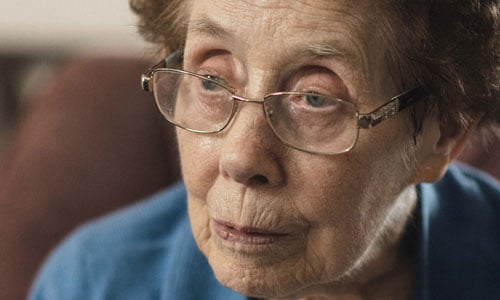
Sometimes I sit here and cry my eyes out.
Concessions to age
In the years since, Brenda stopped working after the arrival of the COVID-19 pandemic, her son got married and has moved away, and she’s downsized into sheltered housing. “The days are long and go by so slowly that you don’t know what to do with yourself,” says Brenda. “You think, ‘Oh, what am I going to do today that I’ve not done already?’ Today I cleaned my kitchen and bathroom, and I watered my plants. Tomorrow I’m going to have my hair done. Then I’ll come home and I’ll hoover, and that's about all that I do really.”
Brenda’s mood can sometimes become low, particularly early in the morning or late at night, when it’s still dark out and the rest of the world feels even further away. It’s for this reason that she finds the winter months particularly difficult. Thankfully, Brenda spends Christmas with her daughter Julie, who often visits to help with the garden – albeit under her mum’s supervision, as she’s something of a perfectionist!
Meanwhile, a friend will also help with Brenda’s shopping, as her eyesight and mobility have deteriorated in recent years, though she’d much rather be able to go herself. “I’d like to have a look round to see what there is, but I can’t so I give her a list.”

I can really rely on Jasmine, which is lovely.
The power of friendship
Not being able to do as much began to make Brenda’s world feel rather small, and on the quieter days, feelings of loneliness and isolation would begin to take hold. Thankfully, someone told Brenda about the Age UK Telephone Friendship Service, which she signed up to and was soon paired with a telephone friend, Jasmine. It has made a life-changing difference.
Despite Jasmine being 60 years Brenda’s junior, the two have struck up a close friendship during their calls each Monday, which they’ve been having for years now, as they have a lot to talk about. For instance, Jasmine is a primary school teacher, while Brenda used to be a school cook, so they enjoy comparing their experiences of working with children.
Aside from having things in common, though, just being able to have a regular call has done the world of good for Brenda, who has some speech challenges after suffering a stroke. “Jasmine’s calls mean an awful lot,” explains Brenda. “Because I might not speak to anyone at all on a certain day. The calls certainly break the day up for me on a Monday, as the day doesn’t seem as long. I look forward to our chats as some days I don’t see a soul. I can really rely on Jasmine, which is lovely.”
Our other Christmas storytellers
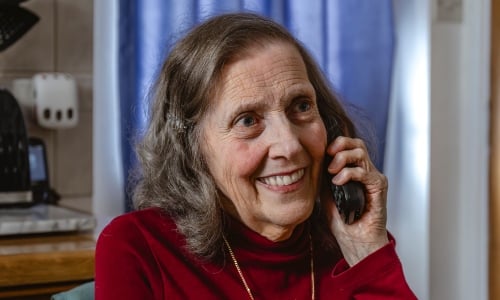
Sandra's story
Since losing her husband, Sandra has found that her friendship with Sarena has supported them both through life's ups and downs.
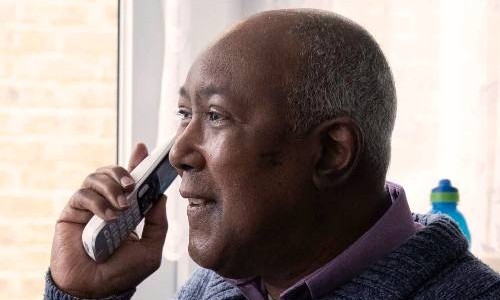
Michael's story
Living with mobility problems, Michael has often felt isolated. But his weekly phone calls with Jemma have helped him to feel less alone.



